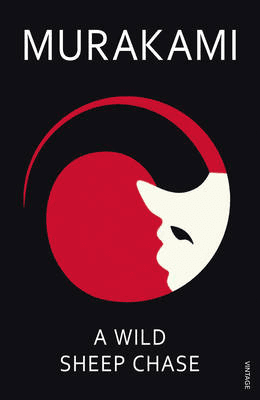1Q84 vs. A Wild Sheep Chase
1Q84
She has entered, she realizes, a parallel existence, which she calls 1Q84 —“Q is for ‘question mark.’ A world that bears a question.” Meanwhile, an aspiring writer named Tengo takes on a suspect ghostwriting project. He becomes so wrapped up with the work and its unusual author that, soon, his previously placid life begins to come unraveled. As Aomame’s and Tengo’s narratives converge over the course of this single year, we learn of the profound and tangled connections that bind them ever closer: a beautiful, dyslexic teenage girl with a unique vision; a mysterious religious cult that instigated a shoot-out with the metropolitan police; a reclusive, wealthy dowager who runs a shelter for abused women; a hideously ugly private investigator; a mild-mannered yet ruthlessly efficient bodyguard; and a peculiarly insistent television-fee collector.
A Wild Sheep Chase
A Wild Sheep Chase by Haruki Murakami is a strange, offbeat novel that blends a detective story with surreal, dreamlike elements. It follows an unnamed, easygoing narrator who gets pulled into a bizarre search for a mysterious sheep with a star-shaped mark on its back. The story kicks off when a powerful figure in Japan’s underworld pressures the narrator into finding this sheep, which seems to hold some kind of mystical influence. The book is set in late 1970s Japan, moving from urban Tokyo to the cold, isolated landscapes of Hokkaido. Along the way, the narrator is joined by his girlfriend, whose unusually perceptive ears give the story an added touch of the weird. They meet a cast of quirky characters—a shadowy secretary, a reclusive professor obsessed with sheep, and a man in a sheep costume who speaks in riddles. What stands out is how ordinary things—bars, hotels, quiet towns—become strange and otherworldly. Murakami mixes humor, loneliness, and philosophical musings, all wrapp...
Reviews
Reviews
| Item | Votes | Upvote |
|---|---|---|
| No pros yet, would you like to add one? | ||
| Item | Votes | Upvote |
|---|---|---|
| No cons yet, would you like to add one? | ||
| Item | Votes | Upvote |
|---|---|---|
| More accessible than some of Murakami’s other works | 1 | |
| Good starting point for new Murakami readers | 1 | |
| Recognized with the 1982 Noma Literary Newcomer's Prize | 1 |
| Item | Votes | Upvote |
|---|---|---|
| No cons yet, would you like to add one? | ||
Frequently Asked Questions
'A Wild Sheep Chase' is often considered a more accessible entry point for new Murakami readers. It has been recognized with the 1982 Noma Literary Newcomer's Prize and offers a balance of Murakami's signature surrealism with a relatively straightforward plot. '1Q84,' on the other hand, is more complex and lengthy, weaving together multiple narratives and a deeper, more intricate storyline. Therefore, if you are new to Murakami, 'A Wild Sheep Chase' might be a more approachable choice.
'1Q84' is generally considered more complex compared to 'A Wild Sheep Chase.' '1Q84' features multiple intertwined narratives, a parallel existence, and a variety of characters ranging from a mysterious religious cult to a reclusive dowager. 'A Wild Sheep Chase' is more straightforward, focusing on a single protagonist's quest. If you are looking for a deeper, more intricate storyline, '1Q84' would be the better choice.
'A Wild Sheep Chase' has won the 1982 Noma Literary Newcomer's Prize. This recognition highlights its significance and impact within the literary community. '1Q84' does not have such a literary award to its name, although it is still a highly acclaimed work by Murakami.
'1Q84' is a novel by Haruki Murakami. It follows the story of Aomame, who realizes she has entered a parallel existence she calls 1Q84, and Tengo, an aspiring writer who becomes entangled in a suspect ghostwriting project. As their narratives converge, the novel explores their profound and tangled connections with a variety of unique characters, including a dyslexic teenage girl, a mysterious religious cult, a reclusive wealthy dowager, a hideously ugly private investigator, a ruthlessly efficient bodyguard, and a peculiarly insistent television-fee collector.
'1Q84' is written by Haruki Murakami, a renowned Japanese author known for his distinct blend of fantasy and reality, often exploring themes of loneliness and existentialism.
The main themes in '1Q84' include parallel worlds, the nature of reality, love and connection, and the power of storytelling. The novel delves into how these themes interweave in the lives of its characters.
'1Q84' is unique for its intricate plot, rich character development, and the seamless blend of the fantastical with the mundane. The novel's structure, alternating between the perspectives of Aomame and Tengo, adds depth and complexity to the narrative.
'A Wild Sheep Chase' by Haruki Murakami is a unique novel that combines elements of a detective story with surreal and dreamlike qualities. It follows an unnamed narrator who is drawn into a bizarre quest to find a mysterious sheep marked with a star on its back, under pressure from a powerful figure in Japan's underworld. The narrative unfolds in late 1970s Japan, transitioning from urban Tokyo to the remote landscapes of Hokkaido, and features a cast of eccentric characters and themes of identity, power, and the search for meaning.
Pros of 'A Wild Sheep Chase' include its accessibility compared to some of Murakami's other works, making it a good starting point for new readers. Additionally, it was recognized with the 1982 Noma Literary Newcomer's Prize. There are no listed cons for this novel, indicating that readers generally find it appealing.
Haruki Murakami is a renowned Japanese author known for his unique blend of magical realism, surrealism, and themes of loneliness and existentialism. His works often explore the complexities of human relationships and the nature of reality. Murakami has gained international acclaim and has written several bestsellers, including 'Norwegian Wood', 'Kafka on the Shore', and '1Q84'.
'A Wild Sheep Chase' explores themes such as identity, power, and the search for meaning. The narrative often blurs the lines between the ordinary and the surreal, inviting readers to reflect on the nature of reality and the significance of the bizarre encounters the narrator experiences throughout his journey.





















